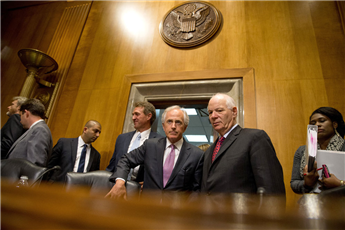Exposing Iran Deal is Congress' Most Important Job in History
IBDEditorials.com

Foreign Relations
Committee Chairman Sen. Bob Corker, R-Tenn., center,
speaks with the committee's ranking member Sen. Ben
Cardin, D-Md., on Capitol Hill on April 14, 2015. AP
Surrender: Overriding the president's promised veto may not be likely if Congress opposes the Iran nuclear pact. Still, both parties can and must alert the world to its grave dangers.
Congress has a job to do — maybe the biggest it's ever had: using its debate and testimony powers over the next 60 days to expose the administration's deal with Iran as the appeasement that it is.
Earlier this year, unfortunately, Sens. Bob Corker, R-Tenn., and Ben Cardin, D-Md., came up with a scheme that supposedly gave Congress a say on the now-agreed-upon Iran deal. But for all practical purposes it gave the president all the power.
In announcing the agreement Tuesday, Obama immediately let it be known he would veto a congressional move to stop it. This means Congress, under Corker-Cardin, would need an override — two-thirds of both houses — to get its way.
More starkly, Corker-Cardin set it up so 34 Democrats can make the Iran deal happen, even if the other 66 senators vote against it. This is democracy?
Increasingly, the U.S. is operating outside the bounds of our Constitution. If this deal, the most consequential the U.S. has negotiated since the end of the Cold War, isn't important enough to be a treaty, what is?
If it were a treaty, two-thirds of the Senate would have to approve it. That would make it dead on arrival. But we don't do treaties anymore when we don't have to. Just as we don't do declarations of war or constitutional amendments.
Corker-Cardin is the hand Congress dealt itself, but it still can — and must — fight this abject surrender. Senators and congressmen must scrutinize the accord's 150 pages — including Democrats who already know it's a disaster, such as Sens. Robert Menendez of New Jersey and Charles Schumer of New York (the likely next minority leader who, despite his pro-Israel record, we fear the White House will buy off).
They must get experts before multiple committees of both houses to identify for members, and the public, the devils that are in the details: how Tehran can still spin uranium centrifuges; why international inspections of its facilities require permission from international bureaucracies; how Iran is allowed to keep ballistic missiles that are only missing a nuclear warhead to carry; how terrorism will be massively expanded once hundreds of billions in Iranian assets are unfrozen.
Then comes debate on the House and Senate floors, and finally a vote. Even short of two- thirds majorities — that is, all Republicans and some Democrats — will make it clear Americans oppose this deal.
Granted, public opposition didn't stop Obama on
ObamaCare. But mushroom clouds are a bigger
attention-getter than skyrocketing health care
premiums.

